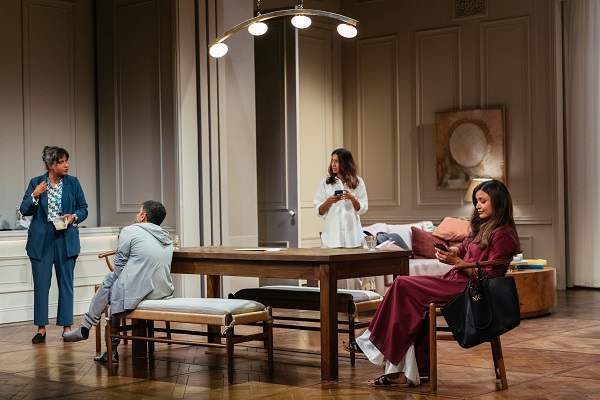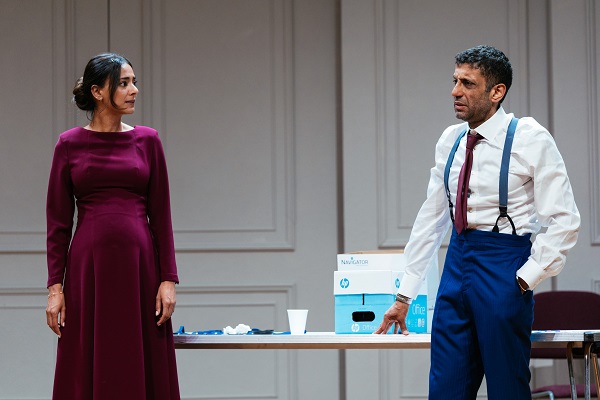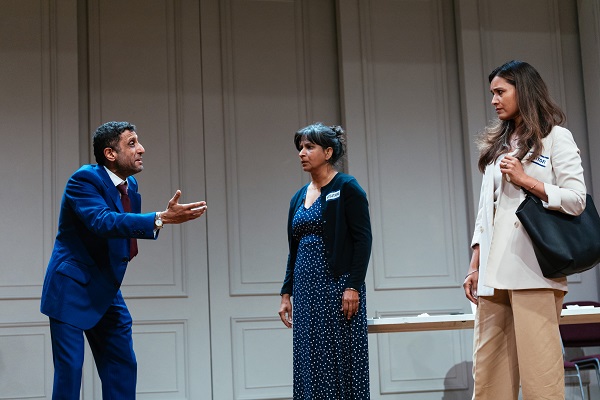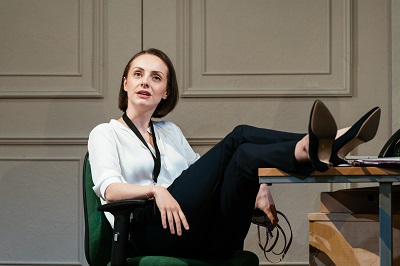‘The Estate’ – Writer Shaan Sahota talks about potboiler of family, ambition and gender wrongs
In its final weeks now, playwright discusses inspiration and motivation to create character siblings that fight one another for a family fortune, while deeper scars remain unhealed…
FEUDING siblings, a disputed inheritance, political ambitions and machinations all get churned together to make ‘The Estate’ – the drama of the season at the National Theatre.
Playwright and hospital doctor Shaan Sahota has produced a work that has got a lot of people talking – both for the play itself and the fact that this is one her early works at The National Theatre no less – one of the country’s most prestigious.
Built centrally around the character of Angad Singh (TV Bafta winning actor Adeel Akhtar), it’s about what happens to families when there is an inheritance that favours a son above the daughters.

Angad personally stands to gain a lot – everything actually. www.asianculturevulture.com has not seen the play but Sahota discussed its central themes with us.

“I started to write ‘The Estate’ in the last year of medical school,” Sahota shared with acv over a Zoom just before its run started.
“I was looking at lots of people going through disputed inheritances and it just seemed to be a recurring theme, especially with South Asian families and those that never talked about the past, and never shared their feelings.”
Sahota stressed the universality of these emotions when there is grief, pain and mourning and loss.
“A lot of people say, it’s not about the money and well, I thought, that’s obviously not true,” she chuckled.
However, while that was a reflexive emotion she explained, something deeper began to work through…

“I became fascinated by what was causing people to behave quite badly…”
In the play, Sahota creates a particular environment around Angad.
He is the only son and his late father was a self-made shopkeeper, then landlord from Southall, west London (known by many as ‘Little India). He has literally gifted Angad everything, while his daughters are effectively shut out.
Angad already has a level of privilege – he was privately educated for the last three years of his schooling, attending a boarding school in Harrow (north London) and as Sahota said, is adept at code switching.
A backbench MP at the start and possibly by inclination, he is thrust into the limelight and has the possibility of becoming the leader of his party – it’s unspecified which or is totally fictional.
“Angad’s funny, charismatic, charming and he can spin any situation.
“He’s very good at hiding where he’s come from. He can banter with the posh boys at Westminster and mix it with others.”
The differences between him and his two sisters is deliberately stark.

There is a good deal of miscommunication and misunderstanding and they haven’t had the same opportunities or investment their brother had.
Shelley Conn (Malicka) and Thusitha Jayasundera (Gyan) play Angad’s sisters. Dinita Gohil plays Sangeeta – Angad’s wife.
“They’re actually quite feral and ungenerous – and ungenerous to each other and unwilling to admit the ways in which their (other) siblings have suffered because they’re so caught up in how they feel.”
The money issues are not the most pressing, explained Sahota.
“It’s not a question of life and death, it’s a bit of a camouflage – it’s hiding other things.”
Angad is in a bit of a bind, his ambitions have been fired by his father’s passing and the question of his own mortality and achievements linger – but on the other side are his sisters and their anger and frustration with him.
“I am trying to make a point about individuals not living up to their values.

“Grief has activated an ambition in him (Angad).”
There’s an alignment between ambition and opportunity and circumstance. Angad is quite newly married and about to have a first child too.
Sahota has written a play before – ‘Under The Mask’ was produced back in 2021 – it was a 60-minute audio based work. (See Review link below).
“He’s in a situation where all logic, rationale and political calculation would suggest that he should just share his inheritance with his sisters – it would make him look good – and if he doesn’t, it could cost him the election, it could cost him his marriage and wreck his family…but he still can’t…” Sahota teased.
An early draft of ‘The Estate’ had a reading at the Park Theatre (north London) to which Nina Steiger – head of new work at The National was invited.
She liked the play but voiced some criticisms and felt it needed more work.
The communication and rewriting led to an attachment at The National.

“I completely re-wrote it,” Sahota revealed. “It had the seed of a good idea and there are some great lines which are still in it, but it was underdeveloped.”
She said some of the dialogue was also too structured.
“It was almost like a debate on fairness and gender equality, whereas now the characters are much more irrational. They don’t express themselves very well and a week later in the shower, they realise what they should’ve said.”
Sahota returned to the central dilemma.
On a short break from medicine when we spoke – but now back at hospital, she said part of the inspiration for ‘The Estate’ was when “everyone is just having the temperature turned up and falling short of their values…What has it taken for someone who thinks of themselves as good to behave like that…?”
All pictures: ©HelenMurray
Listing
The Estate by Shaan Sahota until August 23
Dorfman Theatre
National Theatre
South Bank
London SE1 9PX
https://events.nationaltheatre.org.uk/events/92630
2 hours and 20 mins approx (including 20 min interval)
£10 rush tickets at 1pm – https://www.nationaltheatre.org.uk/fridayrush/
Previously
Note: Character descriptions have been amended since watching (August 14)



